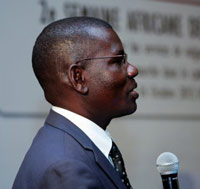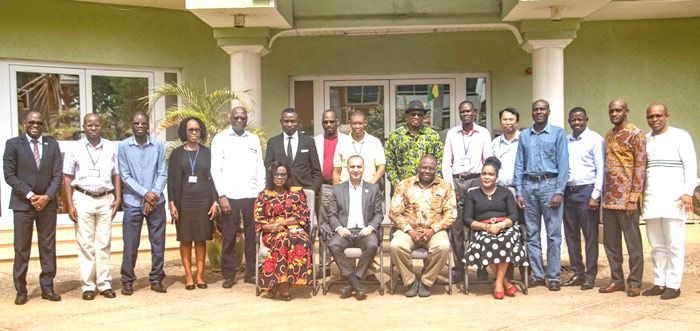
Partnerships, Planning and Learning Specialist
African Forum for Agricultural Advisory Services (AFAAS) is a Continental body that brings National Agricultural Extension and Advisory Services (AEAS) under one umbrella. The AFAAS’ goal is to enhance utilization of improved knowledge, technologies and innovations by agricultural value chain actors for improving productivity oriented towards their individual and national development objectives. AFAAS Operational Plan (OP, 2018-2022) sets three major measureable objectives that are clearly linked and support its Strategy 2018-2027. These include: i) Strategically deliver knowledge of “good fit”, and inputs, products and engagement that are sound and influential in promoting, encouraging and extending knowledge and information exchange among AEAS leaders, academics, researchers, providers, practitioners and value chain participants and actors; ii) Empower AEAS networks, service providers and actors to put to use the knowledge acquired, and facilitate their direct access to technologies needed to trigger knowledge application and deliver solutions to achieve impacts at multiple scales and shape AEAS management and delivery in positive ways; and, and iii) Sustain and enhance the AFAAS networking functions and AEAS thought leadership – Institutional development and services to members; Partnerships for strengthening capacities to achieve impacts at multiple scales; and Foresight, thought leadership and coordinating opportunities, initiatives and learning.
Comprehensive Africa Agriculture Development Programme Ex-Pillar IV Africa Regional and Sub-regional Organisations for Agricultural Research and Innovation (CAADP-XP4) is an important project that should ensure the continuation of the Main CAADP programme that brings research and innovation institutions together. The CAADP-XP4 links research and innovation with development initiatives to boost the transformation of innovation in agriculture and food systems to make them more resilient to climate change and better respond to development demands. Its objective is to enable agricultural research and innovation, including extension services, to contribute effectively to food and nutrition security, economic development and climate mitigation in Africa.
A 4 year partnership
African Forum for Agricultural Advisory Services (AFAAS) and its partners comprising, Association for Strengthening Agricultural Research in Eastern and Central Africa (ASARECA), Centre for Coordination of Agricultural Research and Development in Southern Africa (CCARDESA) Central African Council for Agricultural Research and Development (CORAF) and Forum for Agricultural Research in Africa (FARA) have secured resources from the European Union under the Development Smart Innovation through Research in Agriculture (DeSIRA) initiative to implement a 4-year project in Africa.

Logic and alignement of the project
The goal of the CAADP XP4 under DeZIRA is to contribute to the implementation of Agenda 2030. It will contribute to the progressive achievement of Sustainable Development Goal 2 (zero hunger) and to the action to combat climate change and its impacts (SDG 13). It promotes progress towards ending poverty (SDG 1), gender equality (SDG 5), decent work and economic growth (SDG 8), and responsible consumption and production (SDG 12). The project will additionally contribute to Agenda 2063 and the Malabo Declaration of the African Union (AU). The objective is to enable agricultural research and innovation, including extension services, to contribute effectively to food and nutrition security; economic development and climate mitigation in Africa. This will be achieved by improving the capacity, effectiveness and positioning of the Regional and Sub regional Agriculture research and extension organizations as well as National-Agriculture-Research-Systems (NARS), and by promoting collaboration and knowledge sharing among the organizations. Specifically, the project shall (i) strengthen the operational capacity of AFAAS and its sub regional partner organizations; (ii) improve collaboration within and among the national, sub regional and continental agriculture research and extension organizations; (iii) promote policy enhancement in agricultural research and innovation; (iv) create climate-relevant innovations; (v) promote investments and market linkages; and (vi) enhance knowledge generation and dissemination in support of decision making, advocacy and innovation sharing.
Outputs
The five project outputs are: Output 1: Strengthen the capacities of the individual, continental and regional organizations in competencies needed for the successful implementation of the program (such as technical and organizational capacities in coordination, multi-stakeholder program management, resource mobilization, fiduciary processes and MEL; Output 2: Multi-stakeholder Partnerships for Innovation established and in operation; Output 3: Policies in support of climate relevant agriculture and food systems transformation formulated; investments increased, advocacy and market linkages strengthened; Output 4: Knowledge Management: Knowledge Management & Communication for decision support, sharing innovation and advocacy related to climate relevant agriculture transformation; Output 5: Effective Planning, Coordination, Monitoring, Evaluation, Learning (MEL) & Reporting.

